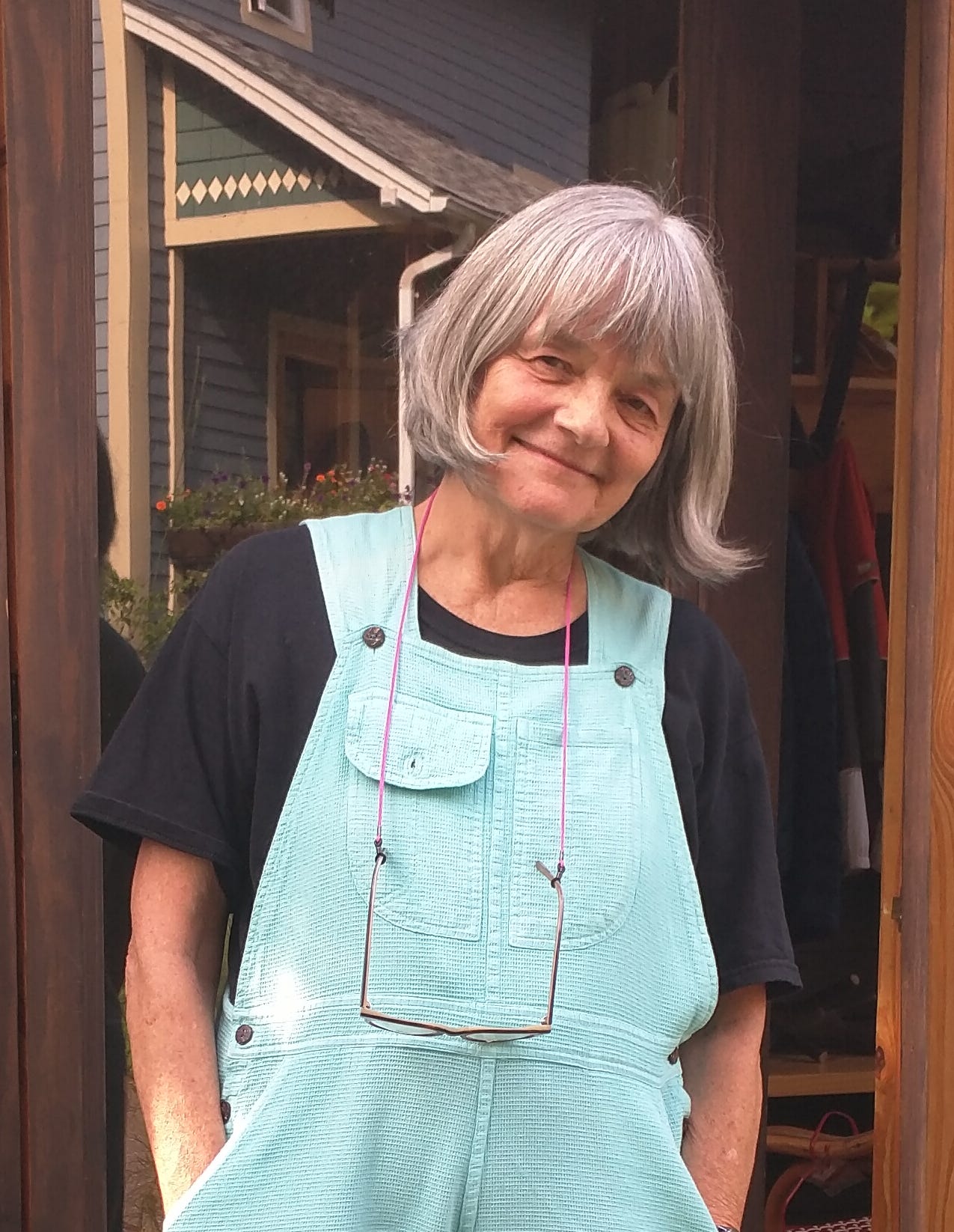Years ago when teaching poetry to second graders, we told them that poems were “big thoughts in tiny packages.” It provided more freedom to play with words, images, and white space without the constraints of complete sentences and punctuation.
Poetry isn’t all fun and games. There is form, meter, rythym, and beauty involved in these gift-wrapped messages to the reader. But some poets can make it look like child’s play.
This month is dedicated to Jane McPhetres Johnson, the most playful poet I know. We have a sampling of four of her many poems (and the following interview) to get a glimpse into the playground of her mind as she cavorts with words, sounds, and meaning.
Enjoy!
Watching Things Unfold
(From a word to a sound, from idyllic to criminal, word-play turns serious when sound meets meaning, and meaning metes meanness.)
Folding laundry, napkins, whooping cranes saving paper bags in slow folded meditation fold a poem in pleats from its top to be told where thinking ends and poetry unfolds. Fold diapers to fit babies folded to fit wombs laps, arms round to hold. In red, black, rusty gold unearthed earthen urns behold elders’ bones in fetal folds, filled with stories long untold. Fold as shelter to bring sheep, hollow among hills, place where we belong. As rivers ribbon fold on fold and doeskin still so softly folds, so lava flows, until its folds turn hard and cold. Daily the world’s worst fears unfold. Protections fold. Farms, schools, clinics fold. Dreamers fold in pray-er mode in airless packed conveyor holds. Copy-catenated crimes we scold in centerfolds. Our dreams fooled, our nightmares foaled, our demons we had hidden in deep mental folds, now faceless identical dolls, unfold so paper-thin, so folioed, to hold each other’s tiny hands in folds. “Folds” first appeared in Indolent Books/What Rough Beast and later in Jane’s poetry collection Maven Reaches Mars, Off the Common Press 2020.
If So
(This poem is two ragged, diminished “sonnets” in shock to find my life timed to end along with my world.)
If what seems to be so is so, what seams to be sewed all sewed up then it matters not what we do indeed what is done is indelibly done and in deeds undone we are too deep and finding them too late to do so we are done for. So how do we live knowing we won’t pass long lives along and what shall we give knowing we’ve given away all that matters so there’s nothing and no one left to give any way to be for given? “If So” first appeared in Silkworm and is the penultimate poem in Maven Reaches Mars in the section for responses to the “end of the world I have known, arrival at a future I had feared, hope for solutions no one has thought of yet, astounded to find my own personal demise coinciding with the arc of a worldwide extinction.”
So-ing Machine
So she So he So they say So instead So it was So there The old so-and-so So it goes So long And so on And so So La Ti Do Ah so So good So bad So far Just so you know Just so much Just So So-so So high So low Solo So what So? So. (This is what can happen when one gets obsessed with a word. Such a small one! So useful. So common. So used.)
So Moving So
(on the Statan Island-Manhattan Ferry)
SO MOVING SO orange so orbital so epochal we are chugging away so fast so doggone slow so touching horizon after ho- rizon, risin’ just so from Staten dock to Hattan haze so dim so distant so thin those pastel tissue towers over lapping water’s edge so blurred so collage so collagen and oh so soon we see so pane-filled buildings so many-eyed towers so we can realize so many real eyes see us at sea so tiny so in our heads so full as statues so full of seers seeing us so fairylike so oh hello Lady Liberty so near so enormous so arm-pumping cool so shrunk to fit on every screen on this chattering ferry we share like air we draw so close withdraw so soon going forth so growing tall so going back so shrinking so filmy so flimsy so moving so This poem appears in Solo: Inner Space Probes, the second fascicle of Maven Reaches Mars. Jane describes Inner Space as "vast and mysterious as Outer Space. The section includes dialogues with self and other imaginary friends. Confined in this spinning capsule, contemplating its thin skin, its inner surfaces, looking out for cracks."
About Jane McPhetres Johnson
Jane McPhetres Johnson lives in Amherst MA.
Born in Colorado, enlightened in the ‘60s and ‘70s, landed in Wyoming with two sons, one born while commuting to Vermont’s Goddard College MFA––during graduation/commencement week. Recent poems in Silkworm, Ekphrastic Review, and Song between the Stars.
Read more in Jane’s book, Maven Reaches Mars: Home Poems and Space Probes in Four Fascicles (Off the Common Books, Amherst MA. 2020).
Other publications, exhibits, and readings include: Microbursts: Anthology by Quabbin Writers Salon (Picaflor Press 2017), Compass Roads (edited by Jane Yolen, Straw Dog Writers Guild 2018), and Not My President: Anthology of Dissent (ThoughtCrime Press 2017), Dragon’s Egg in Mystic CT, Earth Day exhibit in Hadley MA, Forbes Library “Home” show, Northampton MA.
Interview with Poet Jane McPhetres Johnson
LC: When did you start writing and what inspired you?
JMJ: When I was about 10, I won a national short-story contest for kids in Country Gentleman Magazine. (I suspect my mom or my teacher made it happen.) The prize was a poetry anthology and a big boost of confidence and stature in my little world where I was always trying to navigate life as the Principal’s Daughter. My mother was the reference librarian at the Boulder Public Library, and Grandma had met Grandpa when she was the teacher in a one-room school in Kansas. I also edited The Owl, an award-winning high-school newspaper, with friends and boyfriends whose parents were CU professors and who went on to become Harvard and Amherst-educated writers.
LC: Can you describe how you grew into the identity of a writer/poet?
JMJ: Colorado State College was affordable but not culturally or politically enlightening in the 1960s. I was a Blue Key Sweetheart, an ROTC Blue Angel, and a sorority girl, reading more than writing, but seldom inspired by my English professors. It was only after I finally left middle-class, mid-century, Midwestern life behind and got caught up in the anti-war world of San Francisco and Seattle that poetry and writing rose to the top, along with motherhood and marriage, which mostly stunted or snuffed, but sometimes inspired.
LC: How has your writing/poetry changed over the years?
JMJ: Teaching, traveling, trying to make sense of a teetering world changed my writing and changed me. I was teaching school in Scotland when my mother died in the Glasgow train station. Her death, the nuclear and environmental threats, feminism and activism, and even the life-narrowing effect of an inherited hearing loss—all the losses and the accompanying lost innocence led me to self-reflection and a desire to make a difference and change minds, even if only one at a time.
LC: Who are some of your favorite poets/writers?
JMJ: My mother and grandmother quoted Emily Dickinson, Keats, Wordsworth—planted their memorized lines in my empty head. When I managed to publish a few poems of my own while living in northern Wyoming and teaching a few classes at the local community college, I was managing a remarkable art gallery that offered readings by well-known poets of the day, thanks to the state poet laureate Charles Levendosky. Visiting poets included Allen Ginsberg, Sharon Olds, and Diane de Prima.
Levendosky suggested I apply to Vermont’s Goddard College for the low-residency MFA program, which I completed in 1980, the year it moved to Warren Wilson in NC. During those two years I got to know, both on paper and in person, so many favorite poets and fiction writers that I always have difficulty answering this question. A few standouts were Stephen Dobyns, my primary mentor, and Tom Lux, also Louise Gluck, Ellen Bryant Voigt, Donald Hall, and Ray Carver. Mary Karr and Mark Doty were in my graduating class and once regaled the rest of us from a claw-footed bathtub they found in an attic on campus…but they have never been my favorites.
LC: What are you reading these days?
JMJ: several daily poetry feeds online, several genres in print—fiction, nonfiction, memoir, children’s books with grandchildren.
LC: What’s the best advice someone has given you about writing?
JMJ: William Matthews and his paper-folding trick: fold the top back at the line where the poem actually starts; the top part is just pre-thinking. And Robert Haas, who quoted his wife in a workshop at Goddard: make each line contain a surprise. I seldom achieve either piece of advice, but I often think of them when I’m working on a poem.
LC: What are your sources of inspiration?
JMJ: nature, human nature, memory, family, politics, words
LC: Do you have a funny story or anecdote about being a writer?
JMJ: …in a Goddard College MFA class with the portly, important Donald Hall on “metrical feet”: a droll, comical dance, an unforgettable lesson on the iambic two-step, the anapestic waltz, et al.
LC: What advice would you give to aspiring writers/poets?
JMJ: Read!
LC: How often do you write? Do you have rituals or routines?
JMJ: The only routine that has ever worked for me is a writers’ group. I have benefitted from many, including conferences from Aspen to the Olympic Peninsula, from workshops during MFA residencies to informal gatherings in living rooms and feedback from long-suffering family members…the same ones who have always taken priority over any semblance of routine or ritual.
LC: What is your process for writing a poem?
JMJ: Jot it down in the dark or on the highway, whenever at all possible, grieve over all the hordes of missed chances at fame and fortune, then go back and revise over and over again, waiting, sometimes years, until I can read it objectively, as if it were a stranger, no longer my newborn child.
LC: How has being a writer influenced the way you see the world?
JMJ: Can’t read anything—newspapers, media captions, hardbound books—without editing, catching typos, laughing at mistakes.
LC: How do you know when a poem is finished?
JMJ: When I don’t recognize it anymore; when it has become something stunning that has nothing to do with me, a treasure turning up in the wild or dropping out of the sky. I read it with gratitude for whatever magic ingredients came together to bring it into my hands.









